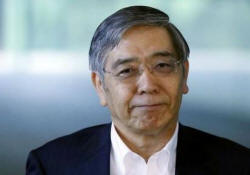|
 OECD
says BOJ inflation goal hard to meet, needs new
commitment OECD
says BOJ inflation goal hard to meet, needs new
commitment
 Send a link to a friend
Send a link to a friend
[September 22, 2014] By
Tetsushi Kajimoto
TOKYO (Reuters) - The Bank
of Japan must make a new commitment quickly to meet its
2 percent inflation target because achieving that goal
by next spring will be difficult, a senior official at
the Organization for Economic Cooperation and
Development said on Monday. |
|
 OECD Acting Chief Economist Rintaro Tamaki, speaking at a news
conference, also urged the Japanese government to proceed with a
second sales tax increase next year as planned to help fix its
tattered public finances. OECD Acting Chief Economist Rintaro Tamaki, speaking at a news
conference, also urged the Japanese government to proceed with a
second sales tax increase next year as planned to help fix its
tattered public finances.
"We assume (Japan's consumer inflation) won't hit 2 percent in a
stable manner in the spring of 2015, so the BOJ should commit to
maintaining monetary easing beyond that as early as possible,
considering the next tax hike in October 2015," Tamaki said.
The BOJ unleashed an intense burst of monetary stimulus in April
2013, pledging to double base money, to achieve the 2 percent goal
in roughly two years. It has stood pat since then, sounding
confident that the economy is on track.
Private-sector economists see the goal is hard to meet, with some
expecting further monetary easing in the coming months.

Tamaki said it would be up to BOJ Governor Haruhiko Kuroda to decide
whether to embark on additional monetary easing.
He called for near-term stimulus, including monetary policy, to
mitigate any impact of the second tax hike, adding however that the
government should steer clear of large stimulus spending given the
need of fiscal consolidation.
April's sales tax rise to 8 percent from 5 percent forced the
economy into the deepest slump in April-June since the 2009 global
financial crisis, raising some concern that Japan may not be able to
cope with the next hike to 10 percent in Oct. 2015.
Prime Minister Shinzo Abe is due to decide by year-end whether to
proceed with the tax hike next year by examining GDP and other
indicators for the current quarter.
[to top of second column] |

Even if third-quarter growth turns out to be weak, Tamaki said Japan
should proceed with the tax hike as planned to curb its public debt,
which is at more than twice the size of its GDP, the worst in the
developed world.
Turning to the weak yen, Tamaki said it would help Japanese exports
to increase gradually but added there was not much room for strong
growth unless the global economy including China stages a solid
recovery.
The OECD slashed its growth forecasts for major developed economies
last week, and trimmed Japan's growth to 0.9 percent this year and
1.1 percent next year even as the economy recovers after April's tax
hike cooled consumer demand in the first half.
(Reporting by Tetsushi Kajimoto; Editing by Chris Gallagher & Kim
Coghill)
[© 2014 Thomson Reuters. All rights
reserved.] Copyright
2014 Reuters. All rights reserved. This material may not be
published, broadcast, rewritten or redistributed.
 |